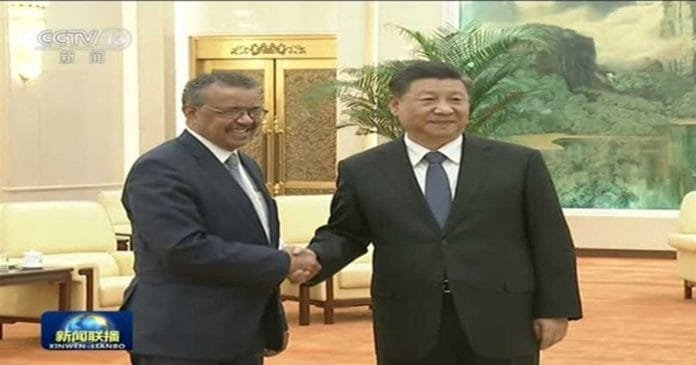
The head of the World Health Organisation said on Tuesday he was confident in China’s ability to contain a new coronavirus that has killed 106 people and that he did not think foreigners should be evacuated, China’s foreign ministry said.
A growing number of countries have said they will evacuate their citizens from Wuhan, a central city of 11 million people and the epicentre of the outbreak. A chartered plane taking out U.S. consulate staff was set to leave Wuhan on Wednesday, a spokeswoman at the U.S. embassy in Beijing said. Some space was being offered to other U.S. citizens.
India said it was preparing to evacuate its citizens from Hubei province, of which Wuhan is the capital.
Concern is mounting about the impact of the coronavirus may have on the world’s second-biggest economy amid travel bans and an extended Lunar New Year holiday. Global stocks fell again, oil prices hit three-month lows and China’s yuan currency dipped to its weakest in 2020.
The head of the WHO, Tedros Adhanom Ghebreyesus, in a meeting with State Councillor Wang Yi in Beijing, said he approved of the government’s measures to curb the outbreak, the foreign ministry said.
“Tedros said the WHO does not advocate for countries to evacuate their citizens from China, adding there was no need to overreact,” the foreign ministry said in a statement. “He said the WHO is confident in China’s ability to prevent and control the epidemic.”
The WHO chief, who also met President Xi Jinping, was not available for comment. A WHO panel of 16 independent experts twice last week declined to declare an international emergency over the outbreak.
The flu-like virus has spread overseas, with Sri Lanka and Germany the latest countries to be hit, but none of the 106 deaths has been outside China and all but six have been in the central city of Wuhan, where the virus emerged last month.
Thailand confirmed six more infections among visitors from China, taking its tally to 14, the highest outside China. Far eastern Russian regions would close their borders with China until Feb. 7, Tass news agency said, citing the regional government.
Chinese-ruled Hong Kong said cross-border ferry services would stop.
Wuhan, where the virus apparently jumped to a human in an illegal wildlife market, has been all but put under quarantine, with a lockdown on transport and bans on gatherings.
Tens of millions of others in Hubei live under some form of travel curbs set up to try to stifle the virus.
The WHO said only one of the overseas cases involved human-to-human transmission.
“That’s still one case too many. But we’re encouraged that so far we have not seen more human-to-human transmission outside China,” the WHO said on Twitter.
“We’re monitoring the outbreak constantly.”
Tuesday’s toll of 106 dead was up from 81 the day before. The number of total confirmed cases in China surged to 4,515 as of Monday from 2,835 the previous day, the National Health Commission said.
China’s Xi tells WHO he’s confident of slaying ‘devil’ virus

Chinese President Xi Jinping told the visiting chief of the World Health Organisation on Tuesday that he was confident of winning the battle against a “devil” coronavirus that has killed 106 people and spread across the world.
A growing number of countries are planning to evacuate their citizens from Wuhan, a central city of 11 million people and epicenter of the outbreak. A chartered plane taking out U.S. consulate staff was set to leave Wuhan on Wednesday, a spokeswoman at the U.S. embassy in Beijing said.
WHO chief Tedros Adhanom Ghebreyesus and Xi discussed ways to protect Chinese and foreigners in areas affected by the coronavirus and “possible alternatives” to evacuations, a WHO spokesman said.
“The virus is a devil and we cannot let the devil hide,” state television quoted Xi as saying.
“China will strengthen international cooperation and welcomes the WHO participation in virus prevention … We believe that the WHO and international community will give a calm, objective and rational assessment of the virus and China is confident of winning the battle against the virus.”
Concern is mounting about the impact the coronavirus may have on the world’s second-biggest economy amid travel bans and an extended Lunar New Year holiday. Global stocks fell again, oil prices hit three-month lows and China’s yuan currency dipped to its weakest in 2020.
A WHO panel of 16 independent experts twice last week declined to declare an international emergency over the outbreak. The spokesman said an increase in cases and deaths in China would not necessarily trigger the emergency status.
Traditionally, the WHO seeks to promote cooperation and avoid antagonizing countries it is helping, or it risks a reaction that could undermine its humanitarian work.
CONTAGION

The flu-like virus has spread overseas, with Sri Lanka and Germany the latest countries to be hit. But none of the 106 deaths has been outside China and all but six have been in the central city of Wuhan, where the virus emerged last month.
The WHO said only one of 45 confirmed cases in 13 countries outside China involved human-to-human transmission, in Vietnam. But a Japanese official said there was a suspected case of human-to-human transmission there too.
Chinese-ruled Hong Kong, the scene of sometimes violent anti-China unrest for moths, announced plans on Tuesday to suspend high-speed rail and ferry links with the mainland.
High-speed rail services will be suspended from midnight on Thursday and the number of flights would be halved.
Thailand confirmed six more infections among visitors from China, taking its tally to 14, the highest outside China. Far eastern Russian regions would close their borders with China until Feb. 7, Tass news agency said, citing the regional government.
Wuhan, where the virus apparently jumped to a human in an illegal wildlife market, has been all but put under quarantine, with a lockdown on transport and bans on gatherings.
Tens of millions of others in Hubei live under some form of travel curbs set up to try to stifle the virus.
Tuesday’s toll of 106 dead was up from 81 the day before. The number of total confirmed cases in China surged to 4,515 as of Monday from 2,835 the previous day, the National Health Commission said.
Communist Party-ruled China has been eager to show it is more transparent in handling this outbreak, after it was heavily criticized for efforts to cover up an epidemic of Severe Acute Respiratory Syndrome (SARS) that killed about 800 people globally in 2002-2003.
INCUBATION ESTIMATES
Analysts said China’s travel and tourism would be the hardest-hit sectors, together with retail and liquor sales, though healthcare and online shopping were seen as likely outperformers.
Officially known as “2019-nCoV”, the coronavirus can cause pneumonia, but it is too early to know just how dangerous it is and how easily it spreads.
Some health experts question whether China can contain it.
Chinese health officials say the incubation period could range from one to 14 days, and the virus is infectious during that time. The WHO estimated an incubation period of two to 10 days.
U.S. President Donald Trump on Monday offered China whatever help it needed, while the State Department said Americans should reconsider visiting China.
Canada, which has two infections and 19 potential cases, warned its citizens to avoid travel to Hubei.
Authorities in Hubei, home to nearly 60 million people, have been the focus of public outrage on China’s heavily censored social media over what many see as a bungled initial response to the virus.
In rare public self-criticism, Mayor Zhou Xianwang said Wuhan’s management of the crisis was “not good enough” and indicated he was willing to resign.
China’s ambassador to the United Nations, following a meeting with UN Secretary-General Antonio Guterres, said his government put “paramount importance” on the epidemic and was working with the international community in a spirit of “openness, transparency and scientific coordination”.
Communist Party-ruled China has been eager to seem open in its handling of the epidemic, after it was heavily criticised for efforts to cover up an epidemic of Severe Acute Respiratory Syndrome (SARS) that killed about 800 people globally in 2002-2003.
SARS, which was also believed to have originated in a wildlife market, led to a 45% plunge in air passenger demand in Asia. The travel industry is more reliant on Chinese travelers now, and China’s share of the global economy has quadrupled.
With Chinese markets shut for the holiday, investors were selling the offshore yuan and the Australian dollar as a proxy for risk. Oil was also under pressure as fears about the wider fallout grew.
The U.S. S&P 500 closed down nearly 1.6%.
Factbox: The new coronavirus – What is it and how does it behave?
Here are some key features of new coronavirus that was identified in the central Chinese city of Wuhan in December and is causing an outbreak of disease in China and beyond.
** Coronaviruses are a family of viruses that get their name from what they look like under a microscope – they are spherical and their surfaces are covered with “crown”-like spikes.
** Coronavirus infections have a wide range of symptoms, including fever, coughing, shortness of breath and breathing difficulties. Mild cases can cause cold-like symptoms, while severe cases can cause pneumonia, severe acute respiratory syndrome (SARS), kidney failure and death.
** Like other coronaviruses, the newly identified China coronavirus is being transmitted from person-to-person via droplets when an infected person breathes out, coughs or sneezes.
** Infection with the newly identified virus has an incubation period of between one and 14 days, and there are limited accounts that it may also be spreading before symptoms show.
** Infectious disease and virus specialists say the scale of the current outbreak now points to “self-sustaining” human-to-human transmission. They estimate that each infected person is infecting, on average, two to three more people.
** Testing for the new China virus involves using a real time polymerase chain reaction (RT-PCR), which identifies the viral RNA in samples. These could throat swabs, cough samples, or blood samples from patients who are very ill.
Factbox: Countries evacuating nationals from China virus areas
Countries around the world are planning to evacuate diplomatic staff and private citizens from Chinese areas hit by the new coronavirus, which is spreading quickly.
Wuhan, a city of 11 million in the province of Hubei and the epicentre of the outbreak is in virtual lockdown and much of Hubei, home to nearly 60 million people, is under some kind of travel curb.
Following are some countries’ evacuation plans, and how they are planning to manage the health risk from those who are returning.
** France’s first plane to repatriate nationals from Wuhan will leave Paris on Wednesday and return the next day. The flight will carry people with no symptoms, junior transport minister Jean-Baptiste Djebarri told television channel CNews. “These people will be put under quarantine. And then there will be a second flight, at a yet undefined date, with people showing symptoms … who will be cared for in Paris,” he said.
** South Korea plans to send charter flights this week to evacuate its citizens from Wuhan, Prime Minister Chung Sye-kyun said on Tuesday. The planes will arrive in the city as early as Thursday, he told a ministerial meeting aimed at discussing efforts to prevent the spread of the new coronavirus.
** Japan will send a charter flight to Wuhan on Tuesday night. Foreign Minister Toshimitsu Motegi said the flight can carry around 200 passengers, but added about 650 citizens hope to return to Japan. Motegi said Tokyo is making arrangements for extra flights to Wuhan as early as Wednesday. Those with symptoms such as fever will be sent to hospital on landing at Tokyo’s Haneda airport, while those with no signs of virus can go home and then to work or school, but will be advised to avoid crowds and take their temperatures twice a day.
** Kazakhstan has asked Beijing to allow 98 Kazakh students to leave the city of Wuhan, deputy foreign minister Shukhrat Nuryshev said.
** Germany will evacuate 90 citizens living in China’s Wuhan region.
** Morocco will evacuate 100 citizens, mostly students, from the Wuhan area. Spain’s government is working with China and the European Union to repatriate Spanish nationals from the Wuhan area, Foreign Minister Arancha Gonzalez Laya said.
** The U.S. State Department said it will evacuate personnel from its Wuhan consulate to the United States and offer a limited number of seats to private U.S. citizens on a flight. Some private citizens will be able to board the “single flight” leaving Wuhan on Jan. 28 for San Francisco, it said.
** Britain is talking to international partners to find solutions to help British and other foreign nationals leave Wuhan, a spokesman for Prime Minister Boris Johnson said.
** Canada has about 167 nationals in the Wuhan area, Foreign Minister Francois-Philippe Champagne said on Monday, and eight people have sought consular assistance, which is being provided. While the minister did not rule out possible evacuations, he did not indicate there were any planned at the moment, adding that each consular request would be evaluated on a “case by case basis”.
** Russia has been in talks with China about evacuating its nationals from Wuhan and Hubei province, Russia’s embassy in China said.
** The Dutch government is assessing ways to evacuate 20 Dutch citizens from Wuhan, press agency ANP reported.
Support Independent Journalism Today
Our unwavering dedication is to provide you with unbiased news, diverse perspectives, and insightful opinions. We're on a mission to ensure that those in positions of power are held accountable for their actions, but we can't do it alone. Labour Heartlands is primarily funded by me, Paul Knaggs, and by the generous contributions of readers like you. Your donations keep us going and help us uphold the principles of independent journalism. Join us in our quest for truth, transparency, and accountability – donate today and be a part of our mission!
Like everyone else, we're facing challenges, and we need your help to stay online and continue providing crucial journalism. Every contribution, no matter how small, goes a long way in helping us thrive. By becoming one of our donors, you become a vital part of our mission to uncover the truth and uphold the values of democracy.
While we maintain our independence from political affiliations, we stand united against corruption, injustice, and the erosion of free speech, truth, and democracy. We believe in the power of accurate information in a democracy, and we consider facts non-negotiable.
Your support, no matter the amount, can make a significant impact. Together, we can make a difference and continue our journey toward a more informed and just society.
Thank you for supporting Labour Heartlands











